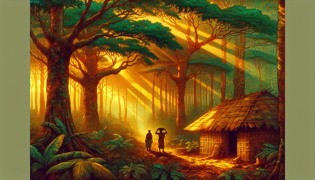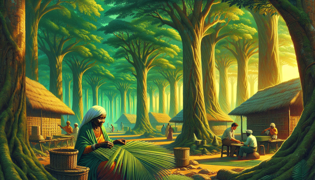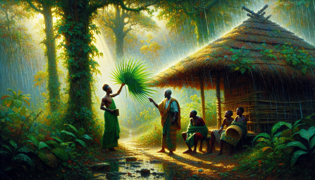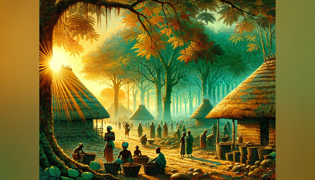The Roof of Leaves: A Tale of Anger and Forgiveness from the Congo
Reading Time: 10 min

About Story: The Roof of Leaves: A Tale of Anger and Forgiveness from the Congo is a Folktale from congo set in the Ancient. This Poetic tale explores themes of Redemption and is suitable for All Ages. It offers Moral insights. When conflict brews beneath the green canopy, only forgiveness can calm the storm.
Introduction
Deep in the heart of the Congo, where vines entwine like whispered promises around giant trunks, the villagers spoke of a roof built entirely from palm leaves. It was said to guard not just against rain but against the storms that gather in human hearts. Two companions, Muntu and Biso, once laughed as children beneath that leafy eaves, racing through sunbeams like windblown paper. But as they grew, a quarrel took root between them, torturing their spirits like thorns digs into soft flesh.
The air was heavy with mist, smelling of damp earth and fruit that hung like lanterns among the branches. A dozen parrots voiced their bright chatter overhead, as if scolding fate itself. Muntu and Biso had argued over a single kola nut, yet the bitterness swelled beyond its humble origin, creeping through waterways of thought until resentment overflowed its banks. The rift under the roof of leaves grew wider than the river Congo in flood.
In the bustle of the village, where drums pounded like distant thunder and women called out mbote pona yo to each passerby, a calm figure emerged: Niaja, the weaver of leaves. She walked barefoot across dewy grass, her fingers agile as monkeys swinging from branch to branch. She carried a coil of fresh palm strips, their texture cool and smooth under her fingertips. Niaja had observed the friends drifting apart, seen anger carve deep lines in their brows, and knew the ancient remedy lay not in pride but in pardon. Sala malamu, she whispered to herself, harking back to lessons taught by elders.
As dawn broke in threads of gold and jade, Niaja prepared to mend more than palm fronds. She would weave a lesson into every strip, a parable stitched in sunlight and shadow. Soon, the story of Muntu and Biso would echo under the roof of leaves, soft as the hush before rain and clear as the bell that summons the village to gather.
The Rift Beneath the Canopy
The villagers began to speak in hushed tones, as though fear of broken bonds might shatter their own peace. Muntu, with eyes dark as the rich soil, refused to meet Biso’s gaze. Biso, whose laughter once rivalled a river’s song, now wore silence like a heavy cloak. The roof of leaves trembled above them in the afternoon breeze, echoing sorrows neither yet dared express. It was said that once the canopy witnessed a quarrel, it carried the burden like a soaked cloth.
Each dawn, Muntu found new slat cut from palm, weaving it into the roof’s centre but leaving a gap where Biso might follow. Like two trees growing side by side but twisting away from one another, their labour blossomed half-finished. Sensory splinters prickled: the salty tang of sweat mixed with sap, the rustle of woven strips like soft rain on skin. A parrot screeched overhead, startling a field mouse into a scurrying dart across the forest floor.
Biso in turn repaired edges with fresh fronds, humming a melody taught by his grandmother. Yet his tune faltered when he approached Muntu’s unfinished section. Fingers that once worked with joyful ease now trembled as if they held a wounded bird. A stray sunbeam illuminated dust motes dancing like stars in a night sky. The tension between them crackled like embers on dry wood ready to ignite.
An elder woman passed by, her voice carrying the wisdom of cedar and clay. "Two hearts like rivers converge only when they yield," she murmured. Neither friend answered, but the words lodged in their minds, slow-growing roots within parched ground. A faint earthy fragrance rose from the moss beneath their feet, calling them back to fertile ground. The village drums pulsed in the distance, a reminder that life went on beyond their silent feud.
By twilight, Muntu and Biso sat at opposite ends of the half-complete roof. Their shadows stretched like lonely pathways. The canopy above shivered against the sky, promising rain. In that moment, both understood: the roof of leaves could shelter them from any storm, but only if they rebuilt it together.

The Weaver of Leaves
Niaja moved like a gentle commotion through the village, a quiet stirring that promised change. Her basket brimmed with palm slats, each as slender as a prayer. She chose a spot where both men could see her work and laid out the green strips like ribbons of hope. With each weave, the sun illuminated her hands as if they were alight with purpose. A sweet scent of fresh chlorophyll wafted upward, mingling with the faint decay of fallen fronds.
"Sala malamu," she greeted them in a hushed tone. The local idiom meant ‘well done’, but carried deeper resonance: an invitation to honour the craft and one another. Muntu and Biso watched in stoic silence, though their shoulders relaxed fractionally, like branches yielding in a calm breeze.
Niaja began a new panel, knotting strips into patterns that mirrored the river’s flow. She likened the dance of the strips to the way forgiveness moulds anger, twisting it into something strong and flexible, like a mighty vine. Metaphors bloomed: her patterns unfurled like a frog’s song at twilight, or the way moonlight ripples on dark water. The friends leaned in as if curious children, drawn by the promise of a story more ancient than the oldest baobab.
The crackle of a small fire nearby drifted through the air, carrying the aroma of roasted plantains. A cicada hummed like a lullaby under the rising heat. In that soft cavern of sound, Niaja spoke of two brothers who nearly drowned the village in their hatred, yet rose from the mud by forgiving each other. She spoke of ancestral leaves that sang when hearts were whole.
With each tale, the roof above absorbed their rifts, sealing cracks like a living mosaic. Muntu’s frown eased; Biso’s jaw unclenched. Neither could recall exactly when their remorse first pierced through pride, but under Niaja’s patient hands the rift closed. At last she looked up, bright-eyed as dawn, and said, "The roof stands strong only when every leaf is in place." The men nodded, voices crackling back to life like distant thunder, ready to finish what they had broken.

Storm of Words
One morning, a sudden squall rattled the canopy, rattling leaves like anxious hearts. Muntu and Biso found themselves shouting over the wind, old grievances surfacing. Their voices rose and collided like flint against stone. Niaja’s woven marvel quivered above them, as if afraid to bear witness. A thunderclap shook the earth, and the two friends stood drenched, not from rain but from tears of frustration and guilt.
Muntu cried out, his voice rough as river rapids. "You betrayed me!" Biso retorted, his tone sharp as broken glass. The words flew like sparks, threatening to set the whole village ablaze. Villagers peered from doorways, clutching gourds of water, hearts pounding like drums in a distant ceremony. The scent of wet bark and fresh rain filled the air, a reminder of nature’s impartial cycles.
Niaja stepped between them, her figure a calm island in a sea of turmoil. She held aloft a single palm frond, its green surface glistening like a warrior’s shield. "Listen," she whispered, her voice steady as a grandmother’s lullaby. "Every word you speak plants a seed in the earth. Will you sow bitterness or bloom forgiveness?"
The wind abated, leaving a pregnant pause. The men recognised that their anger was as wild as a forest fire, consuming all in its path. In that hush, they felt the weight of their shared history: childhood games along riverbanks, laughter echoing in leaf-strewn clearings, promises forged in endless twilight. The canopy above seemed to lean in, each leaf a silent witness.
Biso swallowed hard. "I was blind with pride," he admitted, voice small as a trembling bird. Muntu’s shoulders slumped, the tension bleeding out like dye into water. "And I shut you out," he replied softly. The two reached out, fingers meeting above the heart of the roof. Their touch was tender, like the first rain on parched earth.
With deliberate care, they wove a new strip of leaf between their halves. The pattern gleamed in the dim light, more beautiful for having been broken. A solitary bird began to sing, its song pure as forgiveness itself.

A Tapestry of Forgiveness
As the storm passed, dawn broke in a tapestry of gold and emerald. Muntu and Biso, side by side, worked to finish the roof of leaves. Each strip they wove carried a silent vow: never again to let anger fester like a wound unattended. The canopy above them shimmered with renewed strength, each leaf a testament to healed hearts.
The village gathered to witness the completion. Children perched on termite mounds, eyes shining with wonder, while elders nodded in approval, clapping slowly like distant thunder drums. A gentle breeze carried the scent of wet moss and firelight from last night’s hearth. The roof glowed, as if lit from within by the warmth of forgiveness.
Niaja stepped forward, raising her hand. "This roof holds more than palms," she proclaimed. "It shelters friendship, cares for hope, and honours the courage to forgive." Her words settled softly on every soul, like petals drifting to water. Muntu and Biso lowered their heads, their smiles shy but radiant, as though greeting dawn itself.
A feast followed beneath the new canopy. Ripe bananas and casava, smoked fish and honeyed drinks filled woven bowls. Laughter echoed like birds on the wing. Muntu clasped Biso’s shoulder and whispered, "Koloko te, my friend – no more quarrels." The local idiom eased naturally, warm as ripened fruit.
That night, the forest whispered its approval. Cicadas hummed in velvet darkness, and stars peeked through the palm fronds like curious spirits. The roof of leaves stood firm, a living symbol of forgiveness woven into every fibre. And so the tale travelled on the breeze, carried from village to village, reminding all who heard it that anger may scar but forgiveness can stitch hearts whole again.

Conclusion
Under the glimmering canopy they had reforged, the villagers found a deeper truth: that forgiveness is a living thread stronger than any rope. Muntu and Biso’s friendship became legend, told whenever hearts threatened to fracture. Parents would point to the roof of leaves overhead and say, "Remember the weave that binds both leaf and heart." In time, the story drifted beyond the Congo, carried by traders and travellers like precious beads on a string.
In every telling, the heart of the folktale remained unchanged: anger may blow in like a fierce wind, but forgiveness stands firm like ancient roots. The villagers discovered that the very act of forgiving reshapes the world, turning jagged splinters of hurt into patterns of grace. And though the roof of leaves would one day wither, the lesson it sheltered endured, blossoming anew in each soul it touched.
So when discord arises, remember Muntu and Biso beneath their leafy vault. Let your words be woven with gentleness, your actions threaded with mercy. For in the delicate weave of forgiveness lies the power to shelter us all against the hardest storms.

















